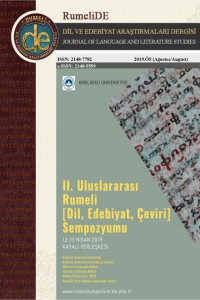Z generation of young people in social media usage patterns of neologisms a quantitative approach in the sample Kırklareli province center
Öz
According generation
theory; the persons who born and growing in the same period is expected to show
the same behavior characteristics. Technological,economic, potical and
social changes are the main reasons for the generations. Every
genaration creates its own fashion , creates its own life style, determines its
priority, tries to follow technological developments of the period, needs to
adopt to its age groups. All these development cause to rise the new words of
that generations. These new words used by the Z generation born after 2000 and
unique neologisms. The aim of our study is to answer the following problems
releated to the neologisms used by young people between the age of 14-18: Which
neologisms (new words) are used by young people in social media? In which
age groups are these new words used and how often do they used? What are the
structural conditional of these new detected words? Are there diffrences in
terms of frequency and form among girls and boys in use of neologisms? As a
method: samples were selected randomly as a total of 100 students and half of
them were girls, half of them boys. social tools such as Facebook, Twitter,
whatsapp the neology used in the students’ speeches were determined. These
words were surveyed and presented as a questionnare to 100 students, were asked
questions about their preferences.In the conclusion section according to the
implications solution suggestions that can be used in educational institutions
are presented.
Anahtar Kelimeler
Kaynakça
- Altunbay, M., & Bıçak, N. (2018). Türkçe Eğitimi Derslerinde "Z Kuşağı" Bireylerine Uygun Teknoloji Tabanlı Uygulamaların Kullanımı. ZfWT , 10 (1), 127-142. Can, A. (2017). SPSS ile Nicel Veri Analizi. Ankara: Pegem akademi. Erten, P. (2019). Z Kuşağının Dijital Teknolojiye Yönelik Tutumları. Gümüşhane Üniversitesi Sosyal Bilimler Enstitüsü Elektronik Dergisi , 190-202. Kuyucu, M. (2014). Y Kuşağı ve Facebook: Y Kuşağının Facebook Kulllanım Alışkanlıkları Üzerine Bir İnceleme. Elektronik Sosyal Bilimler Dergisi , 13 (49-50), 55-83. Moeschler, J. (1974). Aspects de la néologie sémantique. La néologie lexicale. Langages , 6-19. Özden, A. T. (2019). Pozitif Algının ve Tüketici Karar Verme Tarzlarının Y ve Z Kuşakları. Gazi İktisat ve İşletme Dergisi , 1-20. Öztürk, M. C., İspir, B., Birsen, H., Özata, F. Z., Bayraktutam, G., Öztürk, M. C., et al. (2013). Dijital İletişim ve Yeni Medya. Eskişehir: Anadolu Üniversitesi. Şafak, Z. (2018). Fransızca ve Türkçede Akıllı Telefon Bağlamında Yeni Sözcük Kullanımına (Neolojizm) Yapısal Bir Yaklaşım . Namık Kemal Üniversitesi Sosyal Bilimler Enstitüsü Yayaınlanmamış Yüksek Lisan . Tekirdağ. Türk Dil Kurumu Çevrimiçi Sözlük (http://sozluk.gov.tr/) 17.07.2019
Kırklareli merkez örnekleminde Z kuşağı gençlerinin sosyal medyadaki yeni kelimeleri kullanım alışkanlıkları üzerine nicel bir yaklaşım
Öz
Kuşak kuramına göre, aynı dönemlerde doğan,
büyüyen, aynı yaş gruplarında yer alan bireylerin aynı davranış özelliklerini
göstermesi beklenir. Teknolojik, ekonomik,
siyasal ve sosyal köklü değişimler kuşakların farklı olmasının temel
nedenlerindendir. Her kuşak kendi modasını, kendi yaşam tarzını meydana
getirir, önceliklerini belirler, dönemin teknolojik gelişmelerini takip etmeye
çalışır. Bütün bu gelişmeler o kuşağa ait yeni kelimelerin ortaya çıkmasına ve
bu yeni kelimelerin sık kullanılmasına neden olmaktadır. Bu makale Z kuşağının dil kullanımıyla ilgili olup, bu kuşağın
kullandığı yeni kelimelerin kullanım sıklığını incelemektedir. Saha
çalışmalarında öğrencilerin Facebook, Twitter, WhatsApp gibi sosyal medya
araçlarında kullandıkları yeni kelimeler gözlem ve mülakat tekniklerine bağlı
kalınarak tespit edilmiştir. Bu
kelimelerden bir ölçek geliştirilmiştir. Ölçek, oranlı küme örnekleme
yöntemiyle Kırklareli merkezde farklı okullarda okuyan 9, 10, 11 ve 12.
sınıflardan toplam 100 öğrenciye uygulanmıştır. Uygulamadan elde edilen
verilerden öğrencilerin farklı medya uygulamalarını kullandıkları ve bu
uygulamalar ile uygulamanın ortaya çıkardığı yeni kelimeler arasında pozitif
bir ilgileşim olduğu, ayrıca İngilizceden kısmi ve tam ödünçlemelerin Türkçe
yapılarla türetilen kelimelerden daha çok olduğu ve daha sık kullanıldıkları
tespit edilmiştir.
Anahtar Kelimeler
Kaynakça
- Altunbay, M., & Bıçak, N. (2018). Türkçe Eğitimi Derslerinde "Z Kuşağı" Bireylerine Uygun Teknoloji Tabanlı Uygulamaların Kullanımı. ZfWT , 10 (1), 127-142. Can, A. (2017). SPSS ile Nicel Veri Analizi. Ankara: Pegem akademi. Erten, P. (2019). Z Kuşağının Dijital Teknolojiye Yönelik Tutumları. Gümüşhane Üniversitesi Sosyal Bilimler Enstitüsü Elektronik Dergisi , 190-202. Kuyucu, M. (2014). Y Kuşağı ve Facebook: Y Kuşağının Facebook Kulllanım Alışkanlıkları Üzerine Bir İnceleme. Elektronik Sosyal Bilimler Dergisi , 13 (49-50), 55-83. Moeschler, J. (1974). Aspects de la néologie sémantique. La néologie lexicale. Langages , 6-19. Özden, A. T. (2019). Pozitif Algının ve Tüketici Karar Verme Tarzlarının Y ve Z Kuşakları. Gazi İktisat ve İşletme Dergisi , 1-20. Öztürk, M. C., İspir, B., Birsen, H., Özata, F. Z., Bayraktutam, G., Öztürk, M. C., et al. (2013). Dijital İletişim ve Yeni Medya. Eskişehir: Anadolu Üniversitesi. Şafak, Z. (2018). Fransızca ve Türkçede Akıllı Telefon Bağlamında Yeni Sözcük Kullanımına (Neolojizm) Yapısal Bir Yaklaşım . Namık Kemal Üniversitesi Sosyal Bilimler Enstitüsü Yayaınlanmamış Yüksek Lisan . Tekirdağ. Türk Dil Kurumu Çevrimiçi Sözlük (http://sozluk.gov.tr/) 17.07.2019
Ayrıntılar
| Birincil Dil | Türkçe |
|---|---|
| Konular | Dilbilim |
| Bölüm | Türk dili, kültürü ve edebiyatı |
| Yazarlar | |
| Yayımlanma Tarihi | 21 Ağustos 2019 |
| Yayımlandığı Sayı | Yıl 2019 - RumeliDE 2019.Ö5 - II. Rumeli [Dil, Edebiyat, Çeviri] Sempozyumu Bildirileri |


